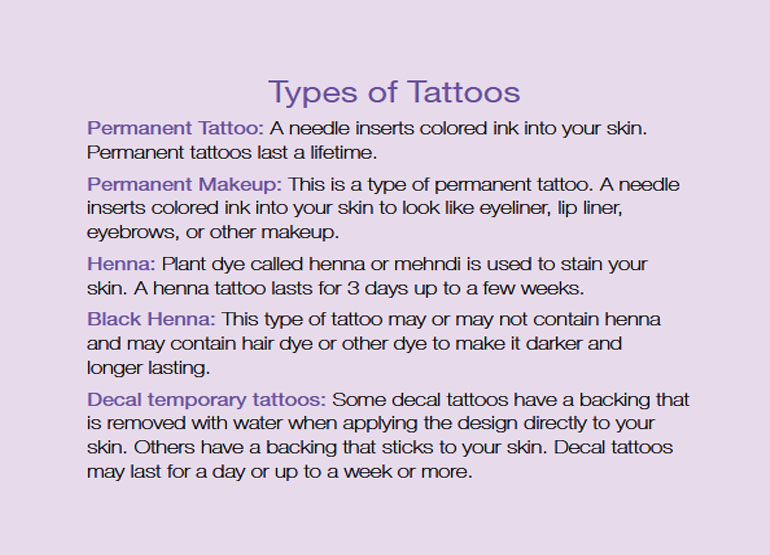Health Pages
About Tattoos & Permanent Makeup
About Tattoos & Permanent Makeup
Tattoos can have serious health effects, and some of these effects can last a lifetime. Because of that it is very important to get the facts and know risks involved before you make the decision to get a tattoo or permanent makeup.
Visit before tattooing and tattoos and permanent makeup pages to find out what risks tattoos and permanent makeup pose, ways to protect yourself and what to do if you no longer want the body art.
Tattooing and piercing are permanent makeup procedures that may increase the risk of contracting a number of serious blood-borne diseases. All consumers should be aware of the risks involved in order to make an informed decision. In addition, be sure to tell your healthcare provider about any tattoos you have before undergoing any type of medical procedure. Find out more about health risks of tattooing and piercing...
A Common Problem: Dissatisfaction
A common problem that may develop with tattoos is the desire to remove them. Removing tattoos and permanent makeup can be very difficult.
Although tattoos may be satisfactory at first, they sometimes fade. Also, if the tattooist injects the pigments too deeply into the skin, the pigments may migrate beyond the original sites, resulting in a blurred appearance.
Another cause of dissatisfaction is that the human body changes over time, and styles change with the season. The permanent makeup that may have looked flattering when first injected may later clash with changing skin tones and facial or body contours. People who plan to have facial cosmetic surgery are advised that the appearance of their permanent makeup may become distorted. The tattoo that seem stylish at the time may become dated and embarrassing later on. And changing tattoos or permanent makeup is not as easy as changing your mind.
Consult your healthcare provider about the best removal techniques for you.
Reporting Adverse Reactions
FDA urges consumers and healthcare providers to report adverse reactions from tattoos, permanent makeup, and temporary tattoos, as well as problems with tattoo removal.
USA: Consumers and healthcare providers can report problems to MedWatch, FDA’s problem-reporting program, on the Web or at 1-800-332-1088; or by contacting the nearest FDA consumer complaint coordinator.
CANADA: Contact your nearest Health Canada Product Safety Office or visit your health care provider for treatment and complete an incident report.
INFORMATION DATE: November 29, 2000; updated June 23, 2008, February 1, 2010, and August 22, 2012. This information is current. It is updated only when necessary.
Learn More:
 What You Should Know Before Tattooing and Piercing
What You Should Know Before Tattooing and Piercing
 About Tattoos & Permanent Makeup
About Tattoos & Permanent Makeup
 Everything You Should Know About Tattoos
Everything You Should Know About Tattoos
 Health Risks of Tattooing and Piercing
Health Risks of Tattooing and Piercing
 Tattoo Removal
Tattoo Removal
 Temporary Tattoos & Henna/Mehndi
Temporary Tattoos & Henna/Mehndi
 Tattoos and Piercings: What to Know Beforehand
Tattoos and Piercings: What to Know Beforehand
 Transmission of Hepatitis
Transmission of Hepatitis
 Hepatitis
Hepatitis



